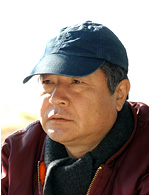
Director: Hiroo Ikeda
Hiroo Ikeda was born in Akita in 1950. After graduating from Hosei University, Starting with a film distributor Zen-No-Ei, he has worked in film as an assistant director and then as a director. He learned filmmaking under the directorship of Satsuo Yamamoto, Tadashi Imai and Yuten Tachibana through the productions of Tenpo Suikoden: Ohara Yugaku, Great Tokyo Air Raids: War and Peace, The Glass Rabbit, Matagi and Under Northern Lights (Japanese-Russia co-production). As a director, he produced Fertile Land, Great Tokyo Air Raids: Children's Testimony, Edo-Style Cuisine: Iki & Sharé, Papier-Mâché Dog and other TV documentaries. His recent work is Constitution: for the Present and Future Generations (video) and his feature documentary film Let Drive at the Day: Takiji is now showing nationwide; it appeals to the audience with its themes of Peace and the Importance of Life. |
 |
Message from the Director
One hundred years have passed since Yanaka Village was abolished.
I wanted to put myself in the darkness, surrounded by the sounds of nature, and above all in the place where Shozo lived, to inhale the same smell of reed and other grass and the same air.
I got permission and went to Watarase Marsh.
On one side of the road, I see the ruins of Raiden Shrine, which Shozo wanted to make a place to sleep, and on the other side there's a cemetery attached to Enmei-in Temple.
Except for a dim light in the direction of Koga City, there's no artificial light.
Moonlight shines upon the village roads.
Sometimes I hear a rustle in the reed.
It sounds as if Shozo and the villagers talked and laughed.
At the first gray of dawn, the slant rays fall on a stupa.
The red sun rises above the horizon of reed. Birds fly.
It's the same Yanaka landscape as Shozo and the villagers saw.
Who destroyed this village, where straightforward and honest farmers lived?
Shozo passionately devoted his life to protect the weak and helpless.
He might have been rough. He might have been rude.
But that is why he could carry out the project (the fight).
The farmers and the supporters were also courageous.
